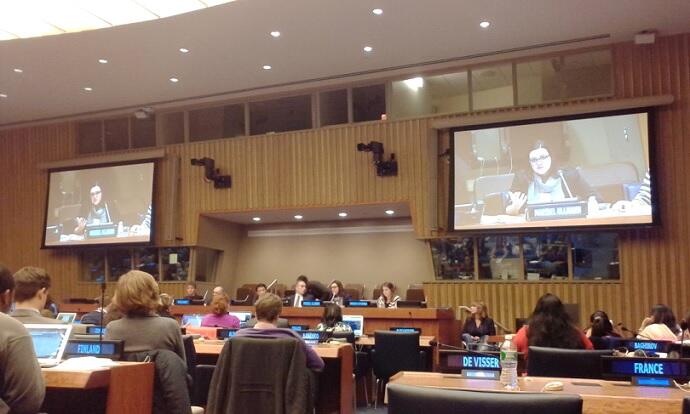Caribbean youth representatives were among the delegates who attended the ECOSOC Youth Forum, February 2-3 at the UN Headquarters in New York. The Forum held under the theme “Youth Engagement in the transition from MDGs to SDGs: What will it take?” was organized by the United Nations Economic and Social Council (ECOSOC) to discuss ways in which young people can and are helping to manage the shift from the Millennium Development Goals (MDGs) to the Sustainable Development Goals (SDGs).
The SDGs are a new, universal set of goals, targets and indicators that UN Member States will be expected to use to frame their agendas and development policies over the next 15 years. The SDGs, expected to be adopted by UN Member States at a Summit in September 2015, follow, and expand on, the Millennium Development Goals (MDGs), which were agreed by governments in 2000, and are due to expire at the end of 2015.
“The forum also addressed ways to ensure that the needs and priorities of all youth are at the centre of the future development agenda and its implementation,” said Shamoy Hajare, a Jamaican youth delegate and a member of the UNFPA Youth Advisory Group (YAG) who participated in the event. “Youth delegates were given the opportunity to openly express their opinions, share their ideas and think collectively about current youth issues and the role young women and men will play in enabling and promoting sustainable development.”
“There were also discussions on how youth issues can be mainstreamed in other global and regional processes, along with other processes happening around the post-2015 development agenda and its implementation,” she noted.
Young people are an important constituent for UNFPA, the United Nations Population Fund. Globally, today’s youth population stands at a record 1.8 billion. Those under the age of 30 comprise 60 per cent of the population of CARICOM countries.
In recognition of the enormous opportunity that young people present for transforming the future, the UNFPA Sub-regional Office for the Caribbean has always reached out and engaged them in its programme development and implementation. An example of this is the Youth Advisory Group (YAG), established in 2006 to serve as a sounding board and a forum for consultation between UNFPA and Caribbean young people. The YAG assists the office in ensuring that it adequately addresses young people’s concern, particularly regarding their sexual and reproductive health and rights, HIV/AIDS and gender issues.
Although not all were able to attend the ECOSOC Youth Forum, they were encouraged and facilitated to participate in the discussions online.
“To whom much is given, much is expected,” Ms. Hajare stated. “Youth delegates must equally hold themselves accountable as they do their leaders during the implementation of the SDGs. Youth are experts in identifying their needs and are key experts in addressing them when given the tools and opportunity to do so. The ECOSOC Youth Forum was one of the many tools young people have been given to actively participate in global processes to positively impact their countries and regions.”
The onus is on youth who participated in the forum to use their initiatives and maximize on their innovative spirits to facilitate change, she continued. “A good place to start would be to conduct local youth consultation focusing on the sensitization and implementation of the Post-2015 Development Agenda and making a correlation with national and regional sustainable development goals to the SDGs.”
Emphasis must also be on linking these processes to national and local discussions for youth development during the implementation process, she stated. “Youth delegates can also create regional and national networks and partnerships with governments, UN country and regional teams and all other stakeholders to ensure that the SDGs are successfully implemented with youth priorities and involvement as core objectives.”


